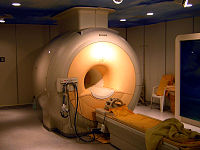
Photo from wikipedia
This study aimed to compare the radiofrequency (RF) shielding effects of titanium mesh of echo-planar imaging (EPI) versus fast spin-echo (FSE) diffusion-weighted imaging (DWI) to establish a suitable sequence for… Click to show full abstract
This study aimed to compare the radiofrequency (RF) shielding effects of titanium mesh of echo-planar imaging (EPI) versus fast spin-echo (FSE) diffusion-weighted imaging (DWI) to establish a suitable sequence for patients who undergo cranioplasty and for whom titanium mesh was used in brain magnetic resonance imaging (MRI). A 1.5-T MRI scanner with clinical setting sequences was used. A phantom for the examination constructed using a sucrose solution in a plastic container was used to compare the signal attenuation (SA) ratio, area of RF shielding effect (Area), normalized absolute average deviation (NAAD), and apparent diffusion coefficient (ADC) between EPI and FSE-DWI. EPI provided significantly better SA ratio, Area, and NAAD ( P < 0.01). When the number of slices increased, the RF shielding became more negative. There was no significant difference in the ADC. Regardless of the k -trajectory, EPI-DWI had a lower RF shielding effect than FSE-DWI in patients undergoing cranioplasty.
Journal Title: Radiological Physics and Technology
Year Published: 2021
Link to full text (if available)
Share on Social Media: Sign Up to like & get
recommendations!